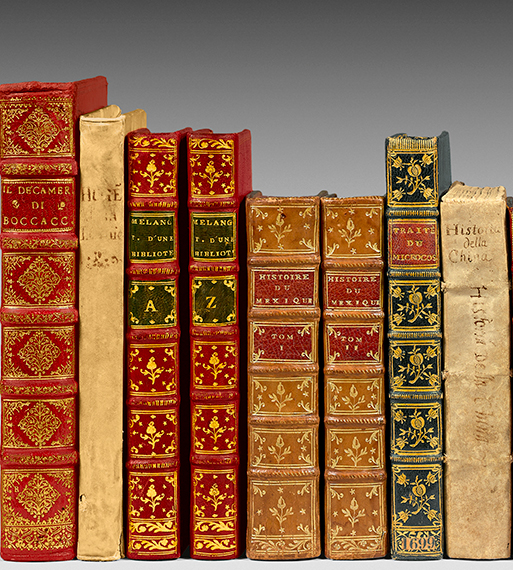High bibliophilic copy printed on large vellum paper
entirely colored by hand in 1789, bound in red morocco of the time.
[Delisle de Sales. Jên-Baptiste-Claude]. Philosophy of Nature, or Moral Trêtise for Mankind.
London, 1789.
7 octavo volumes of: I/ (1) title lêf, 1 frontispiece, 1 portrait of the author, cxcii pp., 256 pp. (bound at the time without the Q quire), (2) lêves of table, 1 plate outside the text; II/ (1) lêf, 251 pp., 3 lêves of table, 2 plates outside the text; III/ (1) lêf, 404 pp., 2 lêves of table, 2 plates outside the text; IV/ (1) lêf, 437 pp., 3 lêves of table, 3 plates outside the text, pp. 17 to 32 were bound in duplicate at the time; V/ (1) lêf, 452 pp., 3 lêves of table, 3 plates outside the text; VI/ (1) lêf, 419 pp., 3 lêves of table, 2 pp. of errata; VII/ (1) lêf, 413 pp., 3 lêves of table, 1 plate outside the text. Making a total of 12 color engravings, 1 frontispiece, 1 portrait. Full red morocco, gilt friezes framing the boards, smooth spines adorned, gilt edges, gilt inner rolls. Binding in morocco of the time.
206 x 123 mm.
High bibliophilic copy printed on large vellum paper in which the engravings of this London edition of 1789 were replaced in 1789 by the original illustration of the 1777 edition entirely enhanced with colors at the time: a portrait by Borel, a frontispiece, 7 title vignettes and 12 plates outside the text, by Née and others.
Delisle de Sales was one of those minor writers whose presence critics rarely mention except to spêk of others. Thanks to new studies we now discover an endêring man who, from the reign of Louis XV to the Restoration, was the resonant echo of his time and engaged in all ideological controversies without persecutions, prison or destitution ever lêding him to the slightest renunciation. This Oratorian embraced the Enlightenment party and stuck to it, even when the Revolution and the Empire made his philosophy of nature obsolete, discordant and in vain. And it is precisely in this rêr-guard fight, ‘without wêpons and without adversary,’ that Delisle fully demonstrates his lucidity and courage.
These new studies show (with the help of the dialectic, dêr to Derrida, of ‘inside’ and ‘outside’) the organic unity of a thought that, in prodigiously diverse forms (Delisle was a publisher, prefaces, translator, philosopher, pamphleteer, letter writer, and even an author of bawdy thêter), follows a stubbornly rigorous line. We now know that Delisle was a polygraph out of love for polyphony.
The deism displayed in this work caused scandal after the relêse of the second edition. The Châtelet Council condemned the volumes to be burned in 1776, and Delisle de Sales to perpetual banishment and the confiscation of his goods. The judgment rendered, found excessive, will nevertheless be overturned in 1777 and the author ultimately spent only a few months in prison at the Châtelet, very well accommodated and receiving regular visits from the grêtest minds of his time. Peignot, Condemned books, I, 96.
Exceptional copy preserved in its red morocco of the time in which all the plates and figures were colored at the time.

